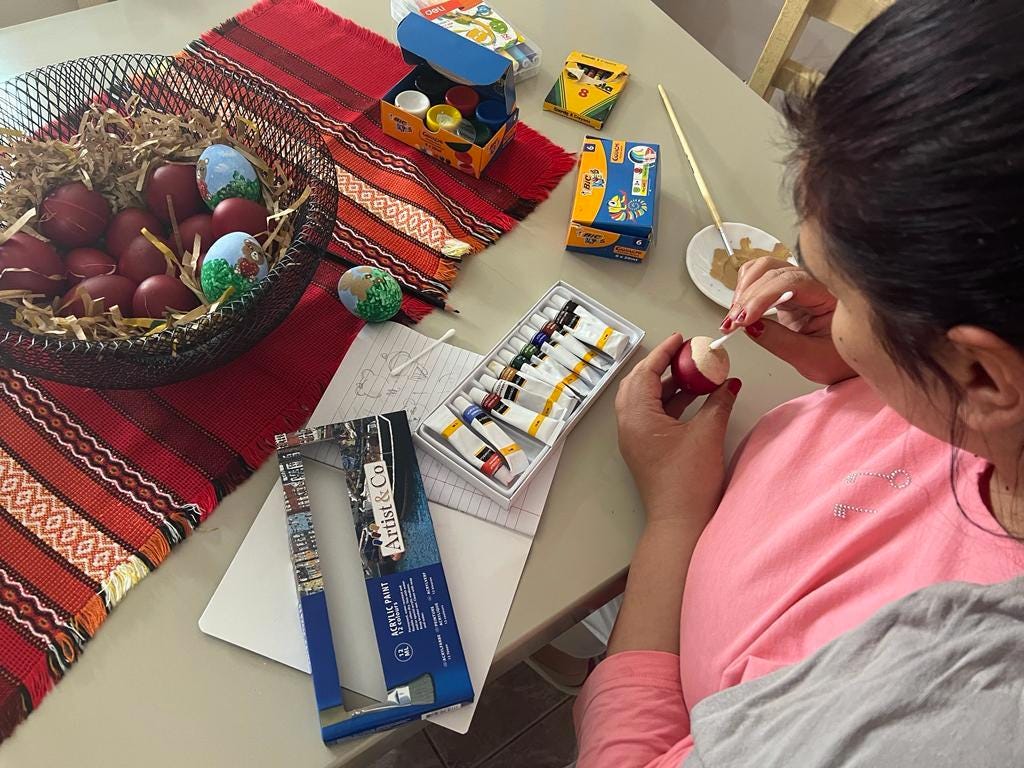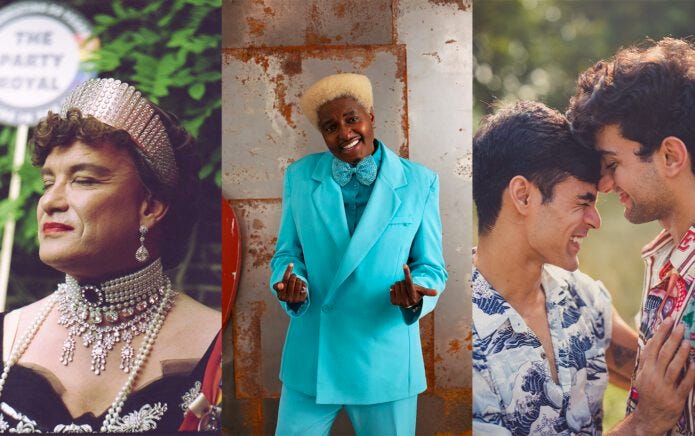Global Roundup: Environmental Activism in Ghana, Albanian Shelter for Queer and Trans Women, ‘Didi Cafes’ in Uttar Pradesh, London Queer Joy Outdoor Exhibition, Indian Woman Develops Healthcare App
Curated by FG Contributor Inaara Merani
Yvette Yaa Konadu Tetteh, who swam 450km down Ghana’s Volta River, onboard The Woman Who Does Not Fear, a solar-powered research catamaran. Photograph: Ofoe Amegavie (The Guardian).
In Ghana, and many other countries in the global south, waste colonialism has deeply impacted the environment. Every week, 15 million garments are imported into Accra’s Kantamanto market in Ghana – these are secondhand clothes from the global north. Although many of the items are repaired, upcycled, and sold, around 40 percent of these clothing items leave the market as waste.
A long-term study conducted by the Or Foundation has revealed that this wastage has spilled into informal landfills, which pollutes water sources and leaves people in Ghana to deal with the product of the global north’s overconsumption and overproduction. To raise awareness for this cause and to show others that there is hope for the future of Ghana’s water sources, Yvette Yaa Konadu Tetteh swam for 40 days down the Volta River.
The Agbetsi Living Water Expedition helped build the case to end waste colonialism and empower the people of Kantamanto to deal with clothing when it enters the country, rather than letting it spread throughout Ghana’s water systems. And so, for 40 days and alongside her fellow researchers, Tetteh chose to swim the entire length of the expedition in order to raise awareness and increase research about the impacts of textile pollution, inflicted upon developing countries by the global north.
Initial water samples from the lower Volta River, about 100km from the main dump site in Accra, showed significantly higher numbers of synthetic microfibres than researchers had anticipated. The water in the river bubbles with noxious gasses, making it hard for individuals to swim and enjoy the beauty of the water. Research and cleanup efforts have been initiated at large textile dumpsites in Accra, and the Or Foundation is extending its data collection to build a map that illustrates the areas in Ghana with high and low pollution levels, along with the types of pollutants.
As a swimmer from the age of four, Tetteh grew up feeling free and confident whilst swimming. Still, the preparation for this journey took seven months, training five to six days a week. Although it was an ambitious journey, Tetteh was able to complete the entire expedition swimming, raising awareness about the microfibre-polluted waters in Ghana.
At the end of the expedition, with the taste of salt water in my mouth letting me know the sea was close, I felt a deep sense of gratitude and purpose. I swim now in the richness of my experience. – Yvette Yaa Konadu Tetteh
Woman carrying out daily activities in the shelter. Credit: Center "Shelter Edlira Haxhiymeri" (UN Women).
Gender-based violence is a widespread issue in Albania. Every one in two women will have experienced at least one instance of violence during their lifetime. In particular, lesbian, bisexual, and trans (LBT) women are at a higher risk for experiencing violence because of the stigmas attached to the queer community in Albania. Some women are forced into marriage, while others are evicted from their homes and from access to support services.
The UN Trust Fund to End Violence Against Women provided a small grant to support the Shelter Edlira Haxhiymeri (SEH). In partnership with the Streha Center for LBT women survivors of domestic violence, these centres run a project which works to end violence against women and girls in four remote areas of Albania.
The program offers women empowering, gender-responsive, and multisectoral services including.psychosocial support; food packages; legal assistance for protection orders, divorce, or child custody procedures; counselling; and shelters. In total, 212 women and girls survivors of violence, including 100 LBT women and girls, have benefitted from these services. SEH and the Streha Center also strive to ensure that women can transition from a shelter to independent living, by providing survivors with vocational training to secure accommodation and employment. As a result of this program, over three-quarters of women and girls have reported living independent lives free from violence.
SEH and the Streha Center build the capacity of service providers like police officers, social workers, educators, and medical professionals. The organizations offer three-day training sessions in which participants can share experiences and learn about tools that address GBV. During the pandemic, things were made worse by the high cost of living, but SEH and the Streha Center work tirelessly to ensure that LBT women are safe and equipped to support themselves against GBV.
(Knock Sense)
The government in Uttar Pradesh, India has developed a strategy to offer important support services to women across the state and stimulate economic growth and activity. The ‘Didi Cafe’ will be launched across 16 cities in Uttar Pradesh. ‘Didi’ means ‘sister’ in Hindi; these cafes will be run by women and will serve as platforms offering public snacks, beverages, and other amenities at a low cost.
Run by women’s self-help groups, this initiative will provide women across the state with employment opportunities. Low employment has reportedly been a challenge for women living in Uttar Pradesh. Under the National Urban Livelihood Mission (NULM), women’s self-help groups were established.
The Uttar Pradesh government plans to launch the first Didi Cafe in the Agra division of the state in the coming months.
As the centres will be located in urban cities, it will be difficult for women living in rural areas to access this form of employment, leading to criticism of the plan for its lack of support for rural women.
While building Didi Cafe is a commendable step and will assist greatly to the upliftment of women, only urban women will be able to find work in such a scheme due to its location in cities. The government should implement a similar programme for rural women. – Vishal Sharma, Vice Chairman of Hindustani Biradari
(GAY TIMES)
In collaboration with SKITTLES®, GAY TIMES, Queer Britain and Getty Images are launching an open-air exhibition in June, titled “QUEER JOY”. The exhibition will be across the King’s Cross neighborhood in London, showcasing 50 striking portraits of queer people, captured by emerging LGBTQ+ photographers from the UK and abroad.
The exhibition will run from June 1 to August 31, offering visitors a free experience to understand the unfiltered, queer self-expression that is vital to the LGBTQ+ community, and vital in highlighting the feeling of queer joy. As part of The Outside Art Project, the portraits will be displayed on outdoor park benches in Granary Square, Pancras Square, and Battlebridge Place. This art collective is well-known for transforming the King’s Cross neighborhood into one of the largest outdoor gallery spaces in London.
The QUEER JOY exhibition is part of a mission to help millions of people “see the rainbow” by working to improve LGBTQ+ representation in photography. This project is a multi-year campaign which will try to fill gaps in the LGBTQ+ archive. Many images were omitted, erased, or nonexistent, leaving a large hole in LGBTQ+ narratives throughout history. The exhibition is designed to ensure the archives of tomorrow are as diverse, representative, and inclusive as possible.
Ten emerging LGBTQ+ photographers will try and capture everyone’s identities to help tackle stereotypes in the media and to better represent the queer community within the UK. The exhibition coincides with the two-year anniversary of the opening of Queer Britain, the first LGBTQ+ museum in the UK. From June 9-11, QUEER JOY will also be running a queer market at Canopy Market.
We’re thrilled to unveil our QUEER JOY exhibition in London as a celebration of unity in the run up to London Pride and beyond. Marking a three-year journey with our brilliant partners to help create the LGBTQ+ archives of tomorrow and shaping them into the dynamic and representative collections they ought to be, we hope that the exhibition will help further spark the feeling of queer joy and inspire vibrant expression. By helping people See The Rainbow we hope to drive more acceptance through visibility! – Ryan Pardo-Roques, Senior Brand Manager at SKITTLES®
(ShethePeople)
A 20-year-old woman from Indore, India was just selected as one of the winners of Apple’s WWDC23 Swift Student Challenge for creating an original health application. Asmi Jain designed an app that can track a user’s eye movements to help strengthen eye muscles, used to help individuals with eye conditions and injuries. She found inspiration for this app after one of her friends underwent brain surgery and was left with facial paralysis and eye misalignment.
On Jain’s app, individuals track a ball around on a screen, which strengthens their eye muscles. After receiving feedback on her app and fine tuning it to ensure it's safe, easy, and effective, she plans to release it to the App Store. Jain hopes that she will also be able to expand her app in the future to include strengthening more muscles in the face and supporting individuals who have experienced different types of traumatic injuries and/or illnesses.
Jain hopes that her app will serve as a therapy tool for individuals needing to improve their eye/face muscles and health. She began to use her coding skills to solve issues in the healthcare sector after she spent years volunteering. Her passion for community service drove her to create something bigger, to support others as they endure traumatic and difficult times in their lives.
Coding lets me create things that help my friends and my community. – Asmi Jain,
Inaara Merani (she/her) recently completed her Masters degree at the University of Western Ontario, studying Gender, Sexuality, and Women’s Studies with a specialization in Transitional Justice. In the upcoming years, she hopes to attend law school, focusing her career in human rights law.
Inaara is deeply passionate about dismantling patriarchal institutions to ensure women and other marginalized populations have safe and equal access to their rights. She believes in the power of knowledge and learning from others, and hopes to continue to learn from others throughout her career.








